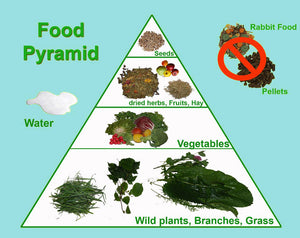What do they eat?
First of all, most treats offered in pet stores are garbage! They're colorful and fun looking and contain all the wrong things for bunnies! Yogurt drops, alfalfa cookies and all that contain way too much sugar and oat, and make the bunnies sick and obese. They don’t have the necessary enzymes to break down the lactose in yoghurt drops. If they need some beneficial bacteria for stomach problems then choose products like Bene Bad or ProBios which are specifically made for small animals.
Grass/Hay
The most natural foods for bunnies are grass and hay. If you’re certain that your lawn is not fertilized and no raccoons visit it in the night, then you may offer your bunnies (after getting them used to it over a couple of weeks) lots of grass.
Because grass usually cannot be offered throughout the year, the alternative is hay. This should be limitlessly offered at all times. Because bunnies have a digestive system that requires them to eat constantly, it is very important to offer them lots of fiber and less calories.
Nutrition for small animals has very much improved over the last two decades, therefore feeding them large amounts of pellets is not only no longer necessary but will also cause them problems long term. Pellets make animals feel full quicker and therefore they will eat less hay which may very well cause all sorts of teeth problems. In addition, pellets almost contain a certain amount of molasses which the producing company needs to add to make the ingredients stick.
Pellets were an invention of the food industry to fatten up animals quicker and to get them to a certain weight faster.
Since there are no pellets in nature we feed very little pellets on a daily basis, more as a treat of a little supplement for our older residents which tend to loose weight more easily.
Veggies daily, fruit only as treat!
Different kinds of lettuce are fine like red and green leaf, romaine, radicchio, endives in all forms, herbs like cilantro, parsley, dill and basil, dandelions if they are available where you live (not all stores carry them), a little kale (very high in calcium), bok choy, fennel root and stalks, carrot tops, celery, parsnip and the list goes on. There are also a number of cooking herbs that are suitable for bunnies to eat like mint, thyme, oregano but should be offered in a limited amount.
The occasional piece of carrot is not only a fine treat but also contains tons of vitamins.
I found that some bunnies also like chinese cabbage. Broccoli has lots of vitamins but should be offered in limited amounts like a treat due to its bloating properties.
Other vegetables such as onions, avocados and potatoes are not suitable.
Flowers and Herbs
They love flowers such as Sunflowers, Rosebuds, Calendulas/Marigolds, and Daisies which can be found in our shop.
They also enjoy herbs like Plantain, dried Stinging Nettle, Echinacea and Chickweed.
Twigs & Branches
If possible, and not all of us have a ranch with fruit trees in our backyards, bunnies love to eat twigs and branches to enable them to wear off their incisors - especially branches from pesticide-free trees: apple trees, hazelnut bushes, pear trees, birch (not too much), alders, willow, currant, and blueberry; some forms of fir can also be fed. But remember: everything must be free of pesticides!
Thuja and yew tree are poisonous!
Water
Fresh water must always be available to the bunnies in a non-dripping bottle or in a heavy bowl which is actually more natural because they do not have to bend their heads; they will usually drink more this way and be healthier.
Additional vitamins, salt blocks or chalk are not necessary. On the contrary, they can lead to kidney problems.
Bunnies do not do well with sudden changes in their diet. So whatever new food you’re trying, start slowly and in small amounts.

